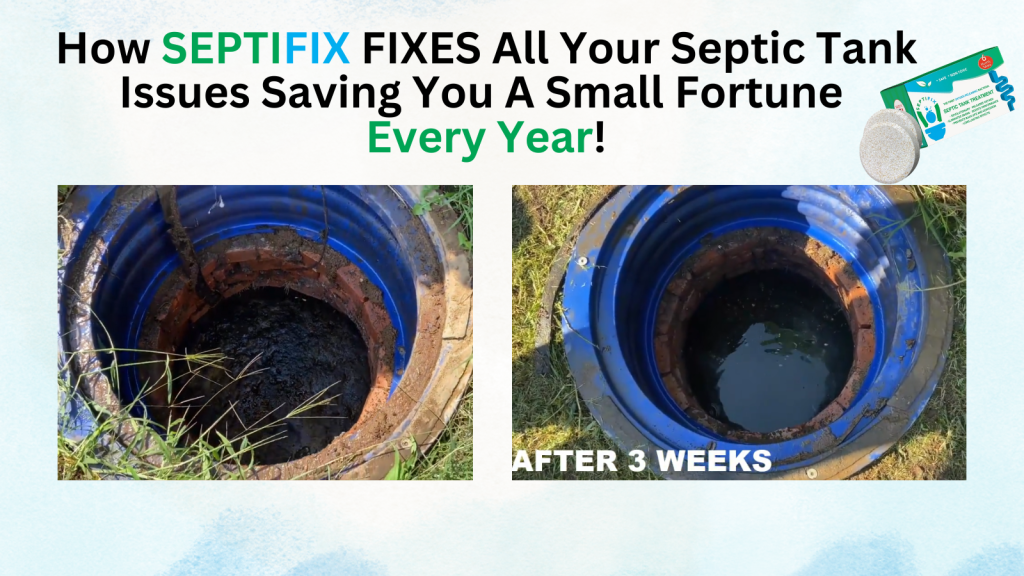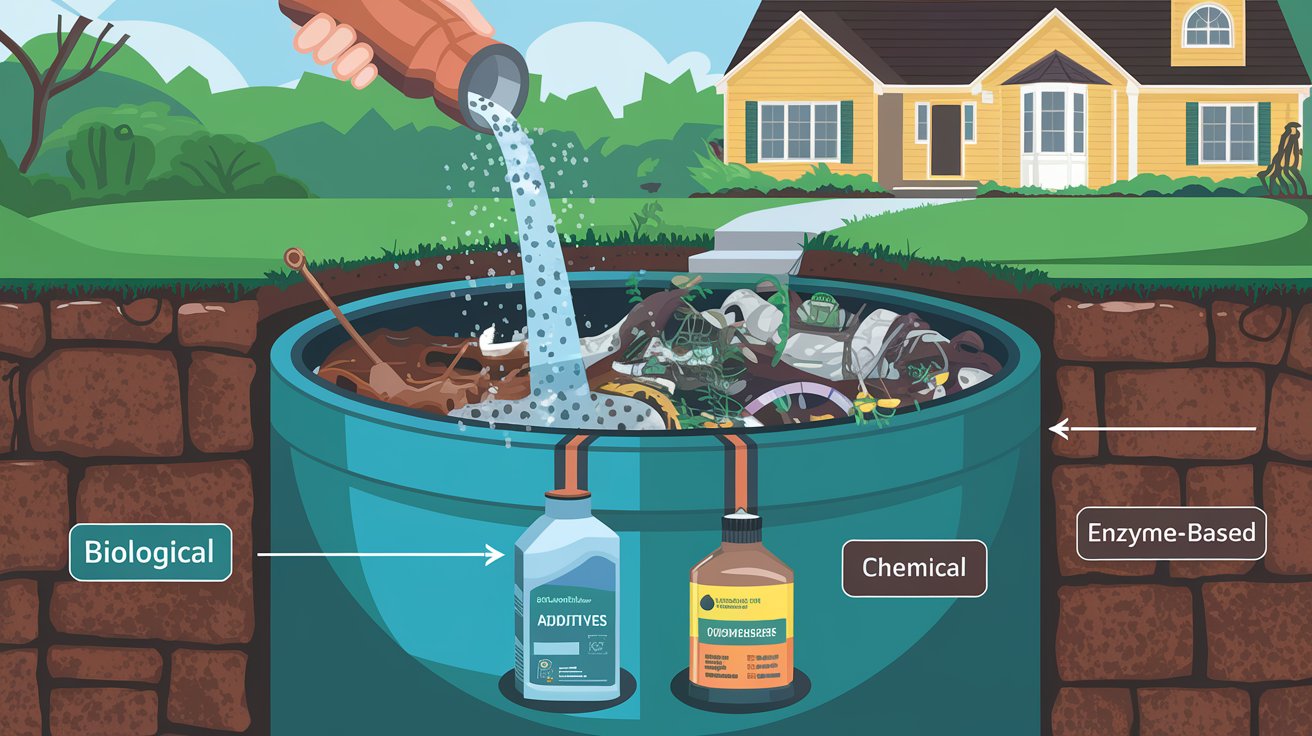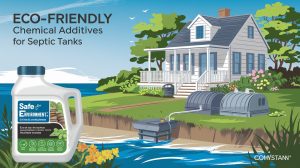Table of Contents
- What Are Septic Tank Additives?
- How Do Septic Tank Additives Work?
- Types of Septic Tank Additives
- Benefits of Using Septic Tank Additives
- Risks and Considerations of Using Septic Tank Additives
- Do You Need Septic Tank Additives?
- Septifix
- Septic Permit Links by State
When it comes to maintaining a healthy septic system, many homeowners wonder, “What are septic tank additives?” Septic tank additives are products designed to help break down organic waste in your system, improve its efficiency, and reduce the need for frequent pumping. These additives come in various forms, including bacteria, enzymes, and chemicals, each serving a unique role in enhancing the performance of your septic tank. Understanding how these additives work and whether they are necessary for your septic system can save you money and prevent costly repairs. In this article, we will explore the different types of septic tank additives, their benefits, and when you might consider using them in your system.
What Are Septic Tank Additives?
Septic tank additives are products designed to enhance the natural processes in your septic system by promoting the breakdown of waste and maintaining the overall health of the tank. These additives can include bacteria, enzymes, or chemicals, each with its own purpose. In essence, their main goal is to help waste decompose more efficiently and reduce the buildup of sludge and scum in the tank.
Septic tanks work by allowing solid waste to settle at the bottom while liquids flow out into a drain field for further filtration. However, over time, waste can accumulate and slow down the process, leading to costly maintenance or system failure. This is where septic tank additives come in. They help speed up the breakdown of solid waste, improve bacterial activity, and reduce the need for frequent pumping, making them a popular choice for homeowners looking to maintain a healthy septic system.
There are a few different types of septic tank additives available, each offering unique benefits. These additives can be found in liquid, powder, or tablet forms, and are typically added directly into the septic tank or the toilet. While some people swear by their effectiveness, it’s important to consider both the advantages and potential risks before using them in your system. In the following sections, we will delve into the different types of septic tank additives and how they work to keep your septic system running smoothly.
How Do Septic Tank Additives Work?
Septic tank additives work by supporting the natural processes within your septic system. They maintain the balance of bacteria and enzymes needed to break down waste, allowing your system to function efficiently. Understanding how septic tank additives work can help you decide if they are right for your system.
Biological Action: Bacteria and Enzymes
Most septic tank additives contain beneficial bacteria or enzymes that aid in the decomposition of waste. These bacteria naturally occur in the environment, but additives can boost their population in your septic tank. The bacteria break down organic material, such as food scraps, grease, and waste, into simpler substances. Enzymes break down larger particles into smaller pieces, making it easier for bacteria to do their job.
The goal of adding these microorganisms is to speed up the breakdown process, reducing the sludge that builds up over time. With fewer solids accumulating in the tank, you may not need to pump your septic tank as frequently. This can save homeowners both time and money on maintenance.
Chemical Additives
In addition to biological additives, some products contain chemicals designed to break down waste more quickly. These chemical additives are often marketed as solutions for heavy sludge buildup or to address slow drainage issues. While they can be effective in some cases, chemical additives come with a cautionary note. Overuse or improper use of chemical additives may disrupt the natural bacterial balance in your septic tank, potentially leading to long-term problems.
It’s essential to understand the potential risks before choosing a chemical-based additive. In most cases, biological and enzyme additives are a safer and more sustainable option for maintaining a healthy septic system.
Effectiveness and Timeline
Septic tank additives generally take time to work. After application, it may take a few weeks to see noticeable results. The additives support the natural processes, but they don’t provide an instant fix for existing issues. In many cases, septic tank additives are most effective when used regularly as part of an ongoing maintenance routine, rather than as a quick fix for major problems.
By regularly adding these products, you can promote optimal bacterial activity and help prevent the accumulation of waste in your system.
Types of Septic Tank Additives
There are several types of septic tank additives available on the market, each serving a unique purpose in maintaining the health of your septic system. Understanding the different types can help you choose the best option for your needs. The main categories of septic tank additives include biological, chemical, and enzyme-based additives, each with distinct characteristics and benefits.
Biological Additives
Biological additives are perhaps the most common type of septic tank additives. These products contain live bacteria that help break down organic waste in the tank. These bacteria are naturally occurring microorganisms that digest the solid waste, converting it into liquids and gases. Biological additives often also include nutrients that promote the growth and activity of these bacteria, ensuring that they thrive and continue to perform their task effectively.
The key benefit of biological additives is their ability to naturally enhance the breakdown of waste without relying on harsh chemicals. These products are generally considered safe for both your septic system and the environment. Regular use of biological additives can reduce the need for septic tank pumping by accelerating the decomposition process, helping maintain the proper function of your system for longer periods.
Chemical Additives
Chemical septic tank additives contain synthetic compounds designed to break down waste quickly and efficiently. These additives are often marketed as solutions for problems such as slow drainage, heavy sludge buildup, or unpleasant odors. Chemical additives typically work by dissolving solid waste or reducing the amount of scum in the tank.
While chemical additives can provide immediate results in addressing specific issues, they come with potential drawbacks. Over time, excessive use of chemical additives may disrupt the natural balance of bacteria in your septic system, making it less effective. Additionally, chemical additives can sometimes cause damage to the environment, as they may contain toxic substances that can leach into the soil and groundwater. It’s important to follow the manufacturer’s recommendations and use chemical additives sparingly to avoid long-term damage.
Enzyme-Based Additives
Enzyme-based septic tank additives contain natural enzymes that break down organic material in your septic tank. These enzymes target specific substances such as fats, oils, and proteins, which can be difficult for bacteria to decompose on their own. By using enzymes to assist in this process, these additives help reduce the buildup of sludge and scum in the tank, improving the overall function of the system.
Enzyme-based additives are typically used in conjunction with biological additives, as they provide a complementary action in breaking down waste. While enzyme-based products alone may not be as effective as biological additives at maintaining the overall health of your septic system, they can be useful for addressing specific issues such as grease buildup or other hard-to-break-down materials.
Choosing the Right Additive
When deciding which type of septic tank additive is best for your system, it’s important to consider the specific needs of your tank and the condition it’s in. Biological additives are generally recommended for regular maintenance, as they promote long-term health without risking the disruption of the natural bacterial balance. Chemical additives may be useful for addressing specific problems, but should be used cautiously to avoid harming your system. Enzyme-based additives are ideal for dealing with specific substances like grease or fats but should also be used alongside other types of additives for optimal results.
Benefits of Using Septic Tank Additives
Using septic tank additives can offer several benefits, especially for homeowners looking to improve the efficiency and longevity of their septic system. While regular maintenance, such as pumping and inspection, is essential, additives can play a key role in enhancing waste breakdown, reducing costs, and maintaining a healthy septic system. Let’s explore some of the key advantages of using these products.
Enhancing Waste Breakdown
The primary benefit of septic tank additives is their ability to enhance the breakdown of organic waste. Septic systems rely on bacteria to decompose waste, but over time, waste can accumulate in the tank and reduce the effectiveness of these microorganisms. By introducing additional bacteria or enzymes through additives, homeowners can speed up the decomposition process. This helps prevent the buildup of sludge and scum, which can lead to blockages, odors, and system failure.
When waste is broken down more efficiently, your septic system operates at its optimal capacity. As a result, you may notice that your system works better, with fewer odors and less frequent backups. This can help extend the life of your system and avoid costly repairs.
Reducing Maintenance Costs
Regular use of septic tank additives can help reduce maintenance costs by minimizing the need for frequent septic tank pumping. While pumping is still necessary from time to time, additives can help break down waste and prevent excessive buildup in the tank. By reducing sludge accumulation, additives can delay the need for costly pumping services, saving homeowners both time and money in the long run.
Furthermore, additives can help prevent more severe issues, such as blockages in the drain field or the need for extensive repairs due to system failure. By keeping the septic system functioning efficiently, additives contribute to the overall longevity of the system, preventing the need for expensive replacements.
Environmental Considerations
Using biological or enzyme-based septic tank additives can be beneficial not only for your system but also for the environment. These additives typically contain natural microorganisms or enzymes that break down waste without introducing harmful chemicals into the environment. This helps prevent the contamination of groundwater and soil, ensuring that the waste in your septic system is properly treated before being released into the drain field.
Chemical additives, on the other hand, can pose risks to the environment if overused or used incorrectly. Some chemical products contain toxic substances that may leach into the surrounding soil, potentially harming local ecosystems. Therefore, it’s important to carefully select environmentally friendly additives and use them as directed to avoid any negative impact.
Improving System Performance
In addition to breaking down waste, septic tank additives can help improve overall system performance. For example, enzymes can target specific substances that may not break down as easily, such as grease or oils, ensuring that your septic system remains effective and free from clogs. Regular use of additives can also help maintain the bacterial balance in the system, improving its efficiency and reducing the chances of issues such as slow drainage or unpleasant odors.
In essence, septic tank additives can help maintain the balance of microorganisms that are essential for a healthy system. By promoting the activity of these bacteria and enzymes, additives support the natural decomposition of waste, keeping your septic system running smoothly and efficiently.

Risks and Considerations of Using Septic Tank Additives
While septic tank additives offer several potential benefits, there are also risks and considerations to keep in mind. Understanding these potential downsides can help ensure that you use additives in a safe and effective manner. Overuse, improper use, or the wrong type of additive can negatively impact your septic system, the environment, and your wallet. Let’s explore some of the risks and considerations to be aware of when using septic tank additives.
Potential Downsides of Overusing Additives
One of the main concerns with septic tank additives is the potential for overuse. While these products can help break down waste and maintain a healthy septic system, adding too much can disrupt the delicate balance of microorganisms in the tank. For example, biological additives can introduce an overload of bacteria, which may lead to excessive gas production or an imbalance in the bacterial population, potentially reducing the effectiveness of the system.
Additionally, some additives, especially chemical-based ones, can cause damage to the system if used improperly. Excessive amounts of chemicals can kill beneficial bacteria that are essential for breaking down waste, leading to sluggish or ineffective waste processing. Over time, this can cause more harm than good, requiring costly repairs or additional maintenance to restore the system’s functionality.
To avoid these issues, it’s important to follow the manufacturer’s instructions and only use the recommended amount of additives. If in doubt, consult a professional to determine the best course of action for your specific septic system.
Risks of Chemical Additives
While chemical septic tank additives can be effective in certain situations, they come with risks. Many chemical additives contain harsh ingredients that may disrupt the natural processes in your septic system. For example, some chemicals can kill the beneficial bacteria in the tank, leading to slower waste breakdown and increased sludge buildup. This can result in more frequent septic tank pumping and, in some cases, the need for costly repairs.
In addition, chemical additives can harm the environment if used improperly. Some chemicals may leak into the surrounding soil or groundwater, potentially contaminating the local ecosystem. To minimize these risks, it’s essential to choose environmentally friendly products and avoid overusing chemical additives. Many experts recommend using biological or enzyme-based additives instead, as they tend to be safer for both your septic system and the environment.
Disrupting the Natural Balance of the Septic System
A healthy septic system relies on the right balance of bacteria, enzymes, and other microorganisms to effectively break down waste. When this balance is disrupted, the system may become less efficient, leading to issues like slow drainage, unpleasant odors, or even complete system failure. Overuse of certain additives, particularly chemical ones, can upset this balance, potentially causing long-term damage to your septic system.
To maintain the natural balance, it’s crucial to avoid using additives as a substitute for regular maintenance. Additives should be viewed as a supplement to, not a replacement for, tasks like septic tank pumping and periodic inspections. If you notice any signs of system malfunction, it’s important to consult a professional to diagnose the issue before relying solely on additives.
Regulatory Guidelines and Recommendations
In some areas, the use of septic tank additives is regulated by local environmental agencies. These regulations ensure that additives are safe for both your system and the environment. Check local guidelines before using any additive, as some areas may have restrictions on certain chemicals or products.
Additionally, experts and septic system professionals often recommend using additives sparingly. Regular pumping, proper waste disposal, and routine inspections are still the most effective ways to maintain a healthy septic system. Additives should be used only as a supplemental tool to improve performance and prevent specific issues.
Do You Need Septic Tank Additives?
While septic tank additives can provide benefits, it’s important to assess whether they are truly necessary for your system. Many homeowners wonder if they should use additives regularly or rely on traditional septic tank maintenance practices. In this section, we’ll explore when septic additives are helpful and when they’re unnecessary, helping you make an informed decision.
When to Use Septic Tank Additives
There are certain situations where septic tank additives can be beneficial. If your septic system has slow drainage, odors, or excessive sludge buildup, additives may help improve its performance. In these cases, additives can accelerate the breakdown of waste, reduce blockages, and restore proper function to the tank. Here are a few scenarios where additives may be useful:
- After Pumping: After pumping your septic tank, additives can replenish beneficial bacteria and enzymes, jumpstarting the waste breakdown process. This can help prevent the tank from becoming sluggish or developing odor problems in the months following a pump-out.
- System Troubleshooting: If your system is showing signs of poor performance, such as slow drainage or frequent clogs, septic additives may help resolve the issue temporarily. If the problem persists, consult a professional to identify the underlying cause, as there may be a more serious issue.
- Boosting Sluggish Systems: In some cases, septic tanks may become less effective over time due to a reduction in bacterial activity. If your system isn’t breaking down waste efficiently, additives can replenish bacteria and enzymes to improve performance.
When Septic Tank Additives Are Not Necessary
Additives can be beneficial, but they may not be necessary if your septic system is well-maintained.
For systems that are functioning properly, regular maintenance and inspections should be sufficient to keep things running smoothly. Here are some situations when septic tank additives are not needed:
- Well-Maintained Systems: If you maintain routine tasks like pumping, inspections, and proper waste disposal, your septic system may not need additives. Well-maintained systems with a healthy balance of bacteria and enzymes may continue to function without the need for additional products.
- New Systems: If you’ve recently installed a new septic system, additives may not be necessary. New systems typically have a healthy microbial balance, and regular maintenance should be enough to keep the system functioning properly. Adding unnecessary additives to a new system can disrupt this balance and may cause more harm than good.
- Minimal Sludge Accumulation: If your septic system shows no signs of excessive sludge buildup or slow drainage, there may be no need to use additives. In such cases, focusing on routine maintenance, such as regular pumping, will likely suffice to maintain system health.
How to Decide if Additives Are Right for You
Ultimately, the decision to use septic tank additives comes down to your system’s condition and your maintenance practices. If your septic tank is in good shape and you follow a regular maintenance schedule, you may not need additives. If you notice slow drainage or odors, additives may provide a temporary solution while you address the issue.
Before deciding to use additives, it’s also important to consult a septic system professional. A professional can assess the condition of your system and advise whether additives would be beneficial. They can also recommend the best type of additive to use, based on your system’s needs.
In conclusion, septic tank additives can be helpful in specific situations, but they are not always necessary. Regular maintenance, including pumping, inspections, and responsible waste disposal, remains the foundation of septic system care. Additives should be used as a supplement to, not a replacement for, routine maintenance. Carefully considering when and how to use additives helps maintain your septic system and avoid extra costs or risks.
Septifix

High Rainfall Areas and Septic Problems: Addressing Waterlogging and Drainage Issues
Can I Install My Own Septic System in Arkansas?
Using Antifreeze in Septic Systems: Safe or Risky?
Central Florida Septic Service Providers
Directory | North Dakota Septic Service Providers : Best Professionals
Chemical Additives for Septic Tanks: Essential Insights on Benefits and Risks
Composting Toilets vs. Septic Systems: Comparing Environmental Impact and Practicality
Directory | North Carolina Septic Service | Part 3









